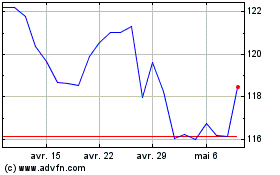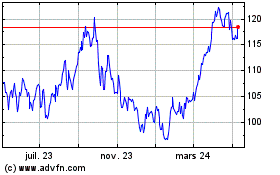Potential Saudi Aramco IPO Wouldn't Include Oil Reserves
25 Janvier 2016 - 3:10AM
Dow Jones News
Saudi Arabia's potential sale of shares in its state-owned oil
giant wouldn't include the kingdom's oil reserves and could be on
local or international markets, the company's chairman confirmed in
an interview that aired Sunday.
"The reserves would not be sold, but the company's ability to
produce from the reserves is being studied," Khalid al-Falih told
Dubai-based al-Arabiya TV in an interview from Davos, Switzerland,
where the annual World Economic Forum was held.
"The reserves will remain sovereign," said the chairman of the
Saudi Arabian Oil Co., better known as Saudi Aramco, adding that
options were being studied to reach the best formula for the
initial public offering.
Aramco says it has more than 260 billion barrels of proven oil
reserves and the equivalent of 50 billion barrels of natural-gas
reserves—more than 12 times the largest publicly traded oil
company, Exxon Mobil Corp.
Analysts didn't expect the IPO to include oil reserves, and the
potential IPO could still create a publicly listed company valued
in the trillions of dollars.
Mr. Falih told The Wall Street Journal earlier this month that
the share sale could include at least part of the company's
exploration and production assets, countering speculation that any
IPO would focus solely on its refining and petrochemical arms.
The listing, which could also include stakes in Aramco's
refining and petrochemical units, was being studied within the
kingdom, and there was no time frame for figuring out the best
path, Mr. Falih said. Saudi Arabia is also considering a partial
listing on foreign stock exchanges.
The IPO of Saudi Aramco, which is essentially an arm of the
government, is being considered as the kingdom faces economic and
political challenges on multiple fronts.
A sustained rout in crude-oil prices has dented the Saudis'
revenue to the tune of billions of dollars, while it is also
carrying out a military campaign in Yemen and is supporting
operations to oust Syrian President Bashar al-Assad. Those
conflicts have led to serious clashes with its regional rival Iran,
with which Saudi Arabia and other Sunni Muslim states have cut off
or downgraded diplomatic ties.
The kingdom's economy is also reaching a transition point at
which it can no longer grow if it remains dependent on petroleum
revenue, consulting firm McKinsey & Co. said in a report
earlier this month.
A number of Saudi experts and insiders have said Saudi Arabia
wouldn't include its production assets in any listing. Aramco is
essentially an instrument of state policy, and its methods and
reserves tantamount to state secrets
Talk of an IPO also comes at a tumultuous time for Saudi Aramco.
Some oil experts have blamed Saudi Arabia for oil prices that have
plunged to levels not seen since 2004, as Aramco pumped more than
10 million barrels a day—a record—last year in a competition with
the U.S., Russia and other big players producing at full tilt.
Mr. Falih told al-Arabiya that the kingdom, however, wasn't
aiming to destroy shale-oil production.
"In the long run there will be a need for shale oil. There must
be a contribution from shale oil and other countries, including
low-cost producers such as Saudi Arabia," he said.
Write to Summer Said at summer.said@wsj.com
(END) Dow Jones Newswires
January 24, 2016 20:55 ET (01:55 GMT)
Copyright (c) 2016 Dow Jones & Company, Inc.
Exxon Mobil (NYSE:XOM)
Graphique Historique de l'Action
De Juin 2024 à Juil 2024

Exxon Mobil (NYSE:XOM)
Graphique Historique de l'Action
De Juil 2023 à Juil 2024
